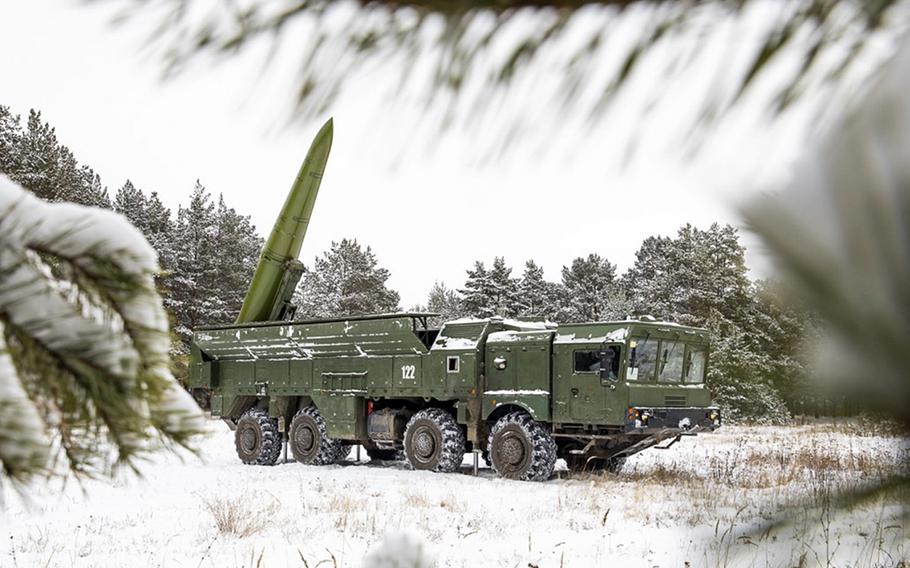
A Russian Iskander short-range ballistic missile system during military exercises in 2019. (Russian Defense Ministry)
European Union states still aren’t doing enough to stop Russia getting hold of sanctioned technologies for use in weapons to wage war on Ukraine, according to officials familiar with the matter.
Tens of millions of euros of trade in banned sensitive goods continue to originate from the bloc itself, despite multiple rounds of sanctions, one of the officials said, based on internal assessments of trade flows.
Almost a quarter of €450 million ($488 million) of so-called high priority items that reached Russia from the EU in the first nine months of last year was shipped directly from Europe. Russia mostly imported the rest via third countries, according to the official, who spoke on condition of anonymity to discuss private information.
Turkey, the United Arab Emirates, Serbia and China were among countries involved in the trade circumventing EU sanctions, as well as states neighboring Russia including Uzbekistan, Kazakhstan, Kyrgyzstan and Armenia. While data show the EU’s direct official trade with Russia in sensitive goods collapsed after the war began, exports of those goods from the bloc to third countries surged to fill the gap completely.
Spokespeople for the European Commission didn’t immediately reply to a request for comment.
The EU’s call for member states to tighten control of exports comes with the war in its third year and Russian forces on the offensive against Ukrainian troops facing dwindling supplies of munitions. Ukrainian President Volodymyr Zelenskyy said Sunday that a decision from the U.S. Congress on more than $60 billion in aid is needed within a month.
The EU and its allies have focused much of their sanctions enforcement work on a list of “common high priority” items in recent months. They include dozens of parts, components and advanced technologies such as semiconductors and electronics that have been found in missiles and other military systems used by Russia against Ukraine, or are essential to producing them.
The bloc’s actions to enforce sanctions have included export restrictions on companies in third countries as well as diplomatic outreach in those nations asking them to curb re-exports to Russia. The EU has also taken powers that would allow it to ban exports of sanctioned goods to a country in the most blatant cases, though some member states have so far resisted using the tool.
The Kyiv School of Economics reported in January that Russia imported $8.77 billion of battlefield goods — a list similar to the EU’s high priority items — between January and October last year.
Most of that trade takes place through networks of thousands of small companies outside the EU — with the vast majority based in China — and often through several steps across different jurisdictions, Bloomberg previously reported.
Shipments are hard to track as they regularly involve chains of multiple vendors and at times re-sellers who may be dipping into older stock.
However, the EU’s internal assessment suggests that a slice of the trade is originating within the bloc. Member states — who are responsible for enforcing sanctions — and companies, knowingly or unknowingly, are doing too little to stop it, the officials said.
The data also suggested that subsidiaries and subcontractors of some European firms operating abroad were producing sanctioned items and exporting them to Russia through intermediaries in middle countries, according to one official.
Major manufacturers have repeatedly said they abide by all sanctions rules and don’t export to Russia.
EU rules do allow some exceptions for export to Russia of so-called dual use goods — a broader group of items that can be used for both military and civil purposes — for reasons including humanitarian needs, health emergencies, natural disasters and medical use.
Between Russia’s February 2022 invasion and last December, more than €560 million ($607 million) of licenses were granted by a dozen member states including Germany, France and Italy, the official said. Over the same period, more than €2 billion ($2.2 billion) of requests were denied.
The exemptions don’t apply for exports of goods to Russia’s defense industry and other sensitive sectors such as energy and aviation, according to the EU’s guidelines.
©2024 Bloomberg L.P.